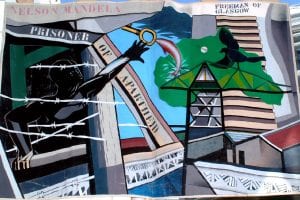On a rainy Saturday afternoon stands were assembled, banners unfurled and hung. Pencils sharpened and leaflets laid. All in preparation for the attendees, as they arrived to mellifluous South African music that melded soon with memories regaled.
This was Banner Tales, an event organised by Glasgow Museums, Glasgow University Geography Department, Glasgow Caledonian University Archive Centre, ACTSA Scotland and Nelson Mandela Scottish Memorial Foundation with the support of the Raphael Samuel History Centre. The two banners under discussion were from the Scottish Anti-Apartheid Archive held in GCU Archive Centre and Glasgow Life. Each authentic to the time period and rich in colour and history.
One of many events throughout October as part of Black History Month, it also coincided with the week of the 25th anniversary of Nelson Mandela’s visit to Glasgow on the 9th of October 1993 to receive the freedom of nine cities.
After an introduction to the event and a welcome to the library by the University Archivist Carole McCallum, Dr David Featherstone explained some of the reasoning behind the concept of Banner Tales. Displays and discussion of historical political banners had proved an invaluable method of getting people to recall stories of activism that may have otherwise been lost to time. It also allows communities to share and understand their contribution to society. The event was recorded and will later be transcribed.

Banner 1 – Nelson Mandela Freeman of Glasgow by Jim Cathcart (GCU)
The first speaker was John Nelson, Secretary of ACTSA Scotland (previously Secretary of the Anti-Apartheid Movement Scottish Committee). He started by talking of attending his first Anti-Apartheid meeting back in 1966 and his words gave scope to the breadth of the Anti-Apartheid Movement in Scotland. Indeed, he noted that he had heard rumours that the word ‘Aberdeen’ was to this day still reviled in parts of white South Africa. It was apparent that John’s history and that of Anti-Apartheid activism were synonymous.
Dr Brian Filling, Chair of the Mandela Scottish Memorial Foundation (one of many titles he holds for work in this area) spoke next. A natural raconteur, he picked up John’s story from the time of the campaign to have Nelson Mandela awarded the freedom of the city of Glasgow while still imprisoned in his homeland, to his finally being able to visit Glasgow to collect the freedom of nine cities in 1993. It was not an easy road, and at times their goal seemed distant as Cathcart is to Cape Town. As with John’s remarks, it was the intensity of the commitment to the movement that shone through. This was not a matter of cerebral or theoretical debate. At its heart it concerned ‘bloodshed and accountability’ even if it was in a faraway land. But as Brian noted, in time ‘what had seemed like a modest campaign turned into a mass campaign.’
In their words, John Nelson and Brian Filling encapsulated so much of the struggle, tumult and eventual exultation of the Scottish Anti-Apartheid Movement.

Banner 2 – Sechaba Festival, September 22 – 7 October 1990 (Glasgow Life)
Seated in front of the huge and vibrant Sechaba Festival banner, Suganya Chetty spoke movingly of her family’s experience and of coming to Britain half a century before. Her voice cracking with emotion, she read a poem and explained what the word Sechaba meant to her.
The banner by osmosis seemed to make the assembled remember and reflect on their own experiences. Brian Filling spoke again about the task of staging the Sechaba festival. There were memories shared of the difficulties on putting on an event on such a scale. Audience members talked about putting performers up in their own homes, a signifier if ever there was one of the famous Glasgow hospitality. Any difficulties encountered were worth it. As one audience member noted – it was something they could look back on and been proud to have been a part of.
There followed a nuanced and thoughtful discussion on the issue of boycotting South Africa cultural exports. A lightning rod was the Paul Simon album Graceland – recorded in South Africa with native musicians and thus flouting the cultural boycott. It was the view of one audience member that what the Sechaba Festival had succeeded in was allowing the debate around the notion of total cultural boycott to play out amongst anti-apartheid activists. By having a festival full of South African musicians, it was no longer an issue that could have been ignored.
The Banner Tales event as part of Black History Month was good-humoured but serious, reflective but forward looking. A worthy event and a heartening gathering on a rainy October afternoon – classically Glasgow weather reminiscent of how it had been on that special day 25 years earlier, when the great Nelson Mandela himself came to visit.
As is often the case at such events, t-shirts, Sechaba audio recordings and various memorabilia were kindly donated by activists to GCU Archive Centre, and for that we are very grateful. In words, reminiscences and tangible items, the memories will live on to inform future generations.
David Ward
Archive Assistant